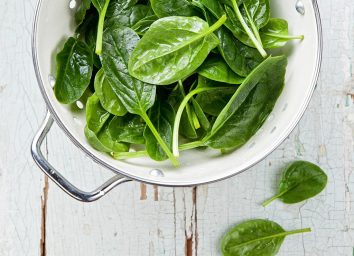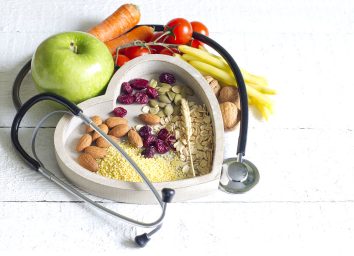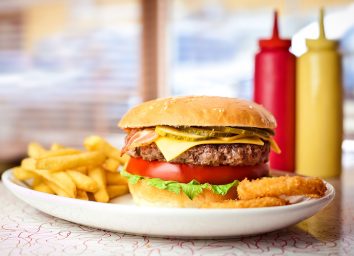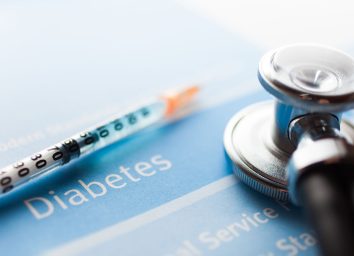The Common Foods That Raise Your Heart Attack Risk
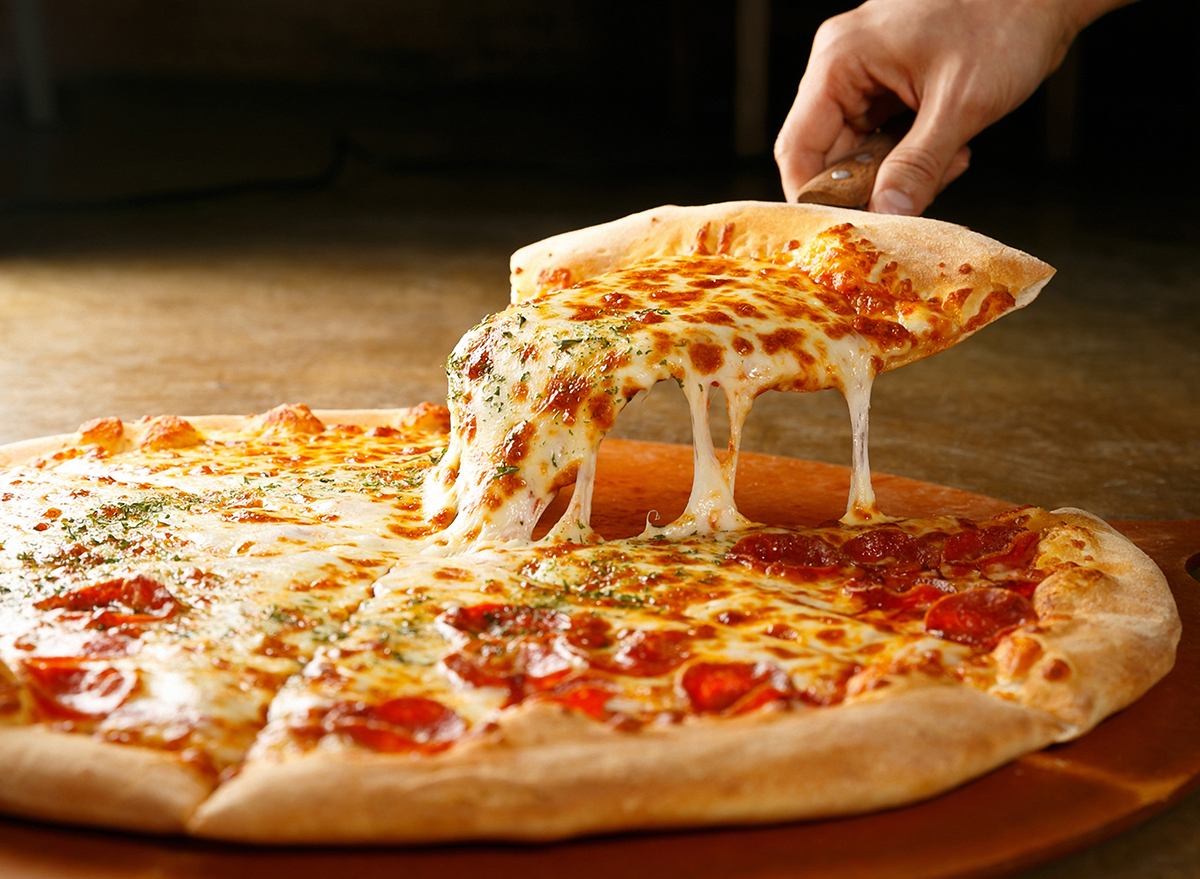
Heart disease is the leading cause of death in the United States, claiming one life every 36 seconds, according to the CDC. But there are ways you can avoid becoming a statistic and lower your heart attack risk, and that starts with maintaining a healthy diet.
The FDA recommends that people consume less than 10% of their daily calories from added sugar. But many of us are consuming more than that each day, which isn’t great for heart health. And in addition to sugar, sodium is another concern, as eating too much salt can raise blood pressure. And high blood pressure can cause their arteries to harden and narrow, increasing the risk of heart disease. Plus, there’s also saturated fats to keep in mind, as research has proven that eating foods with high saturated fats can raise your LDL, or “bad” cholesterol, and put you at risk for heart disease, which can lead to a heart attack.
In short, foods that are high in sugar, salt, and saturated fat can ultimately be raising your heart attack risk without you even realizing it. In order to drastically improve your cholesterol and blood pressure levels and overall risk of having a heart attack, you’re going to want to revamp your diet as best as you can.
Read on to see which foods you should avoid in order to keep your heart pumping properly. And while you’re making healthier changes, be sure to add The 7 Healthiest Foods to Eat Right Now to your diet.
Baked Goods
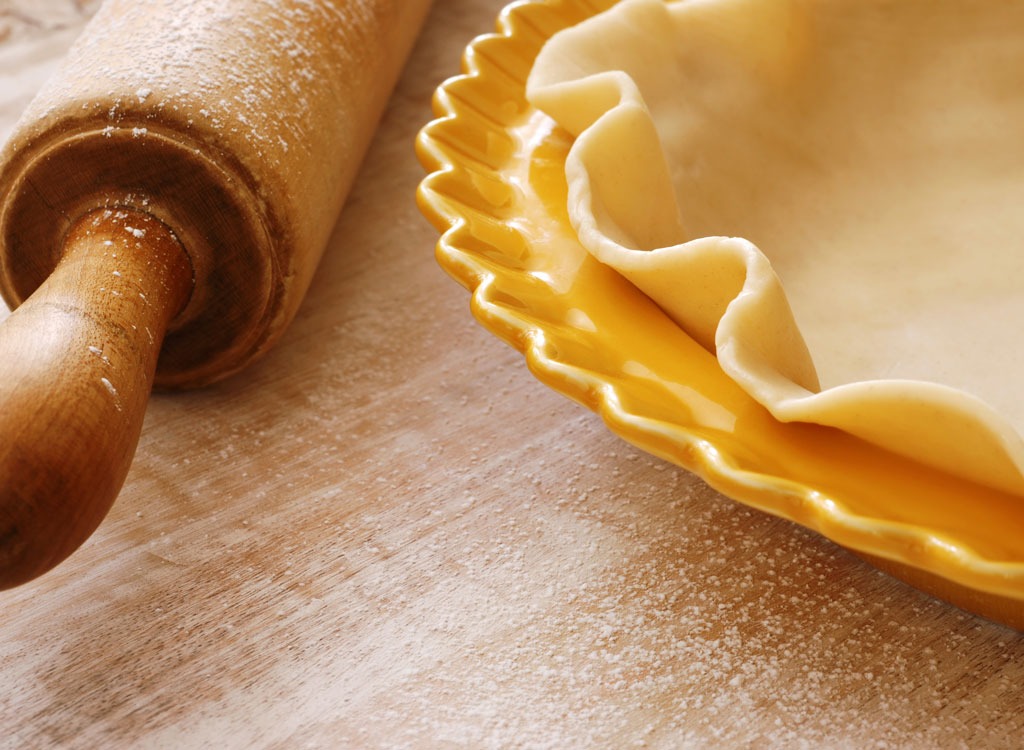
“Baked goods have a double whammy of sugar and hidden saturated fat,” says Adam Splaver, MD, clinical cardiologist and co-founder of Nano Health Associates. “[They] generally have no nutritional value and often contain hidden saturated fat and hydrogenated shortenings, which may raise your bad cholesterol.” Some hydrogenated shortenings also contain trans fats, which have been shown to raise cholesterol levels.
One 14-year study of 80,000 women, published in the New England Journal of Medicine, found a positive correlation between heart disease and the consumption of foods containing trans fats. Stay away at all costs—your ticker and waistline will thank you.
French Fries
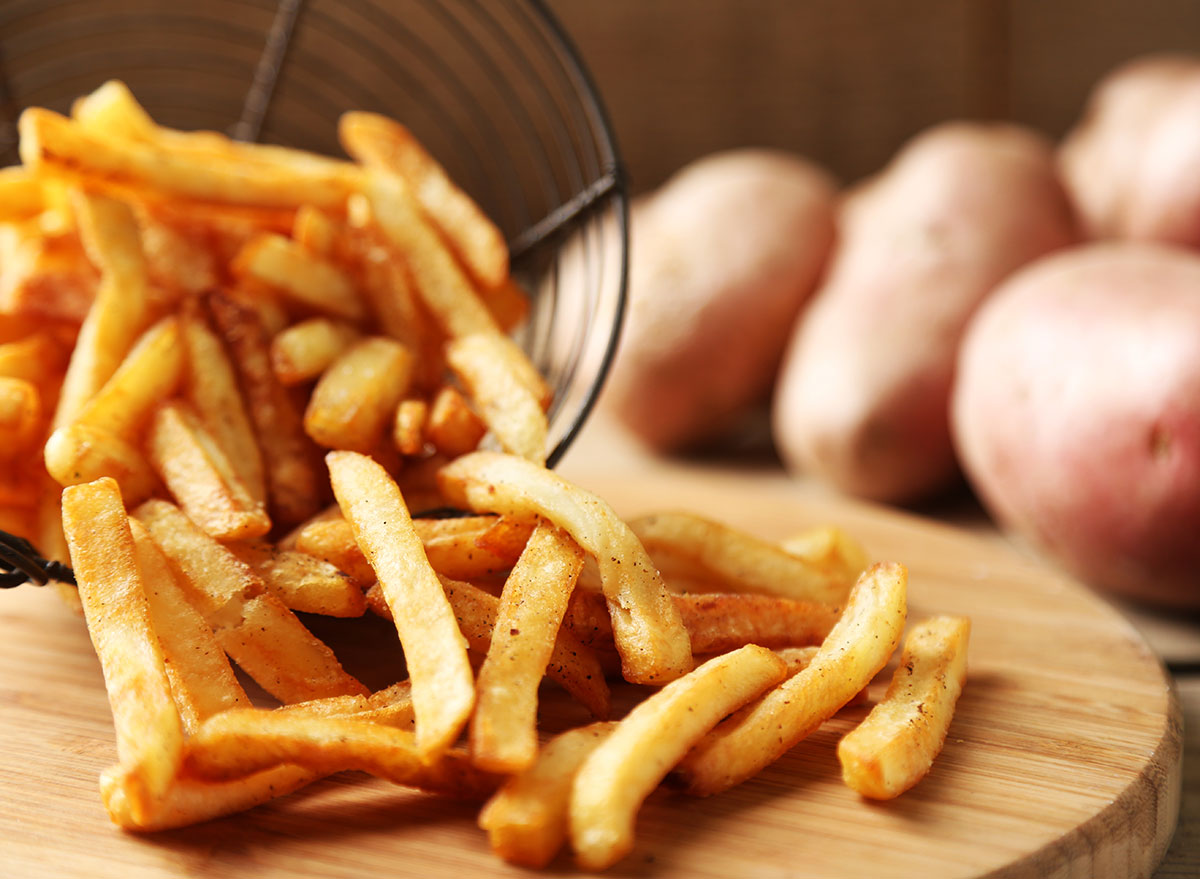
Obesity and belly fat have long been linked to cardiovascular disease. The more fat that’s stored in your midsection, the higher your blood pressure, blood sugar, and cholesterol levels are bound to be. Consider French fries a triple threat to your heart health by those standards. Not only are they filled with simple sources of carbs that can spike your blood sugar, but they’re also filled with fat and salt, too.
Ice Cream
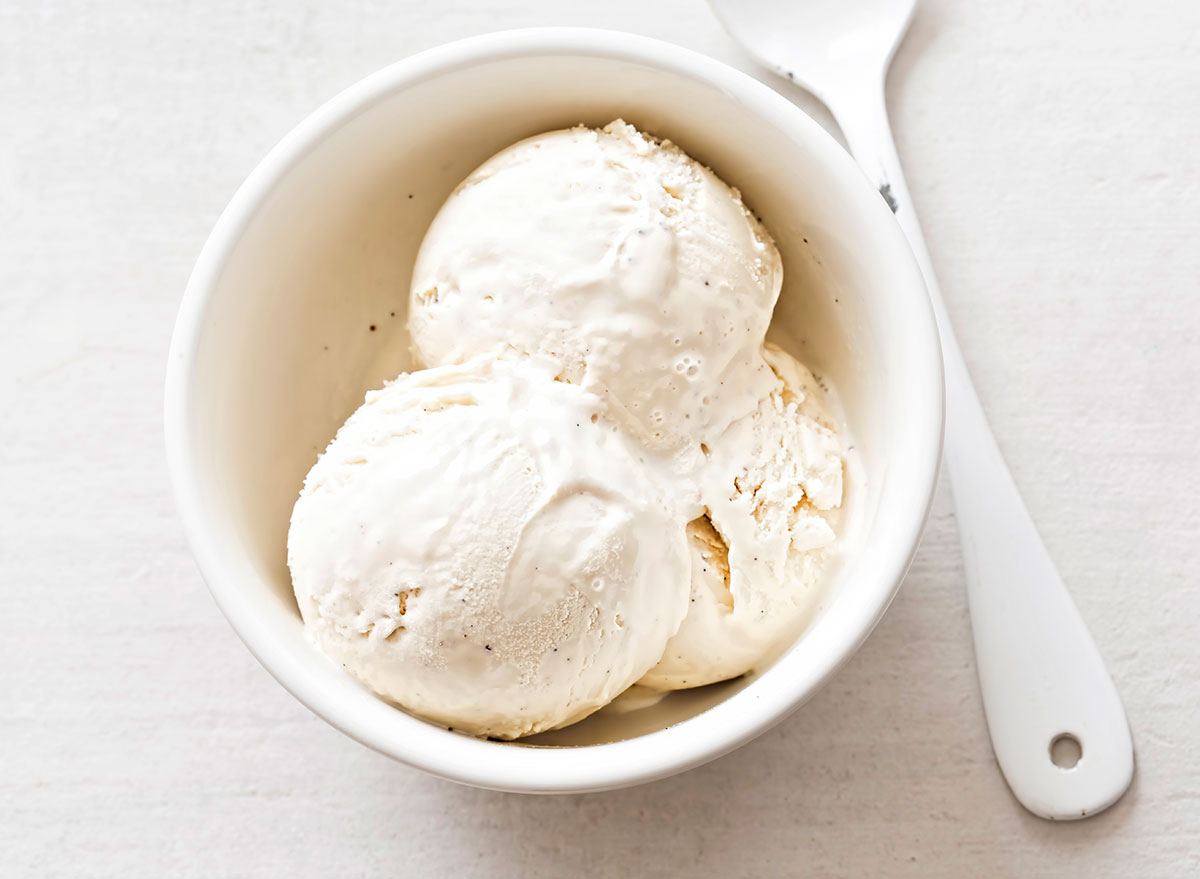
When you have more cholesterol in your blood than what’s considered to be healthy, it can clog your arteries with plaque that increases the risk of heart disease, so a healthy adult should consume no more than 300 milligrams of cholesterol a day. A cup of certain Ben and Jerry’s ice cream flavors contain more than a third of the day’s intake—and so do plenty of other creamy, cool treats. Plus, ice cream is also high in saturated fat, a no-no for your heart, and calories, which can contribute to weight gain and poor heart health.
To indulge in something icy without freezing out your heart, make a batch of banana ice cream. Here’s how: Slice two bananas and place them in a bag and freeze overnight. The next day, blend them up on high with some milk and almond butter until the mixture reaches a consistency that resembles ice cream. Shavings of dark chocolate make for a tasty topping, as do raspberries, another heart-healthy food.
Cheese
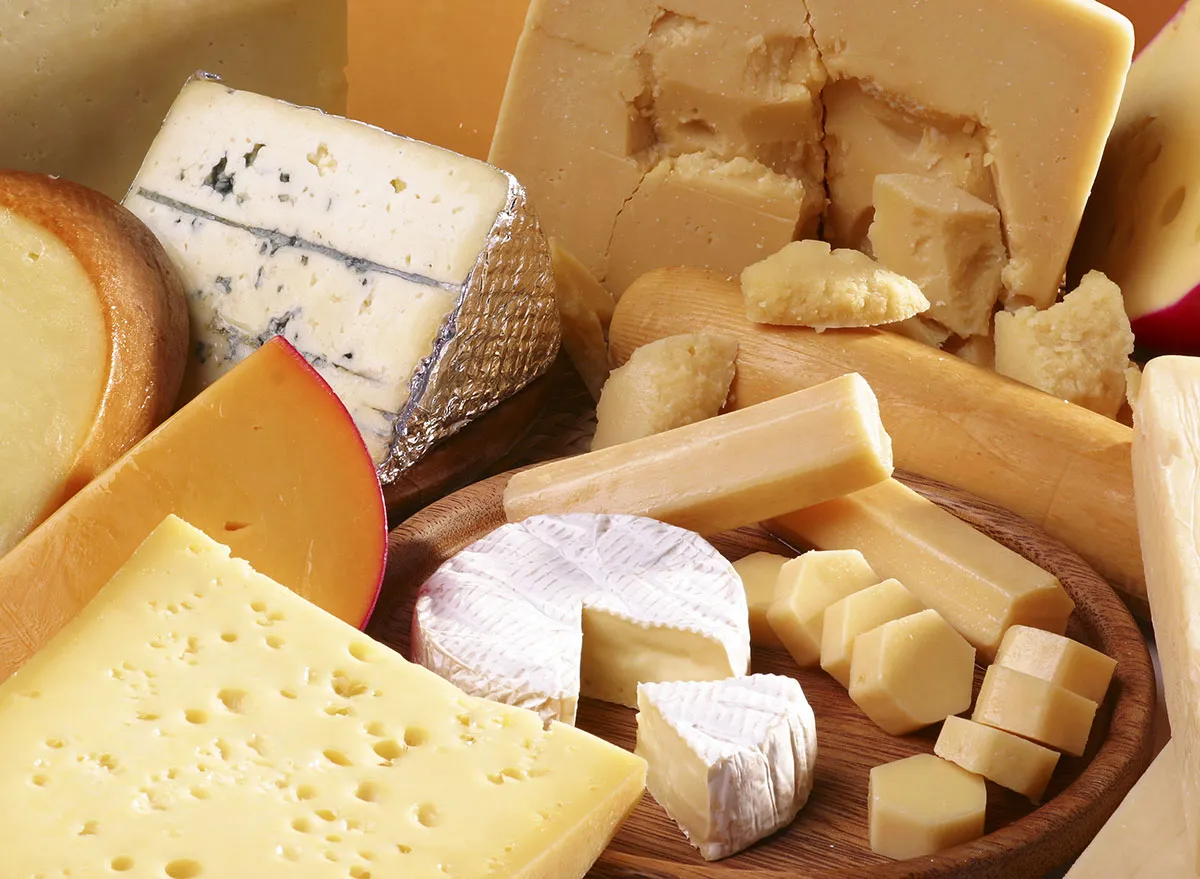
Fun fact: Cheese is the single biggest contributor of saturated fat to the American diet. And unlike other fats, the saturated variety is the one most likely to be stored in the stomach and wreak havoc on your cardiovascular well-being. Scale back on the mozzarella and cheddar to zap away belly fat and keep your ticker pumping problem-free.
Pizza
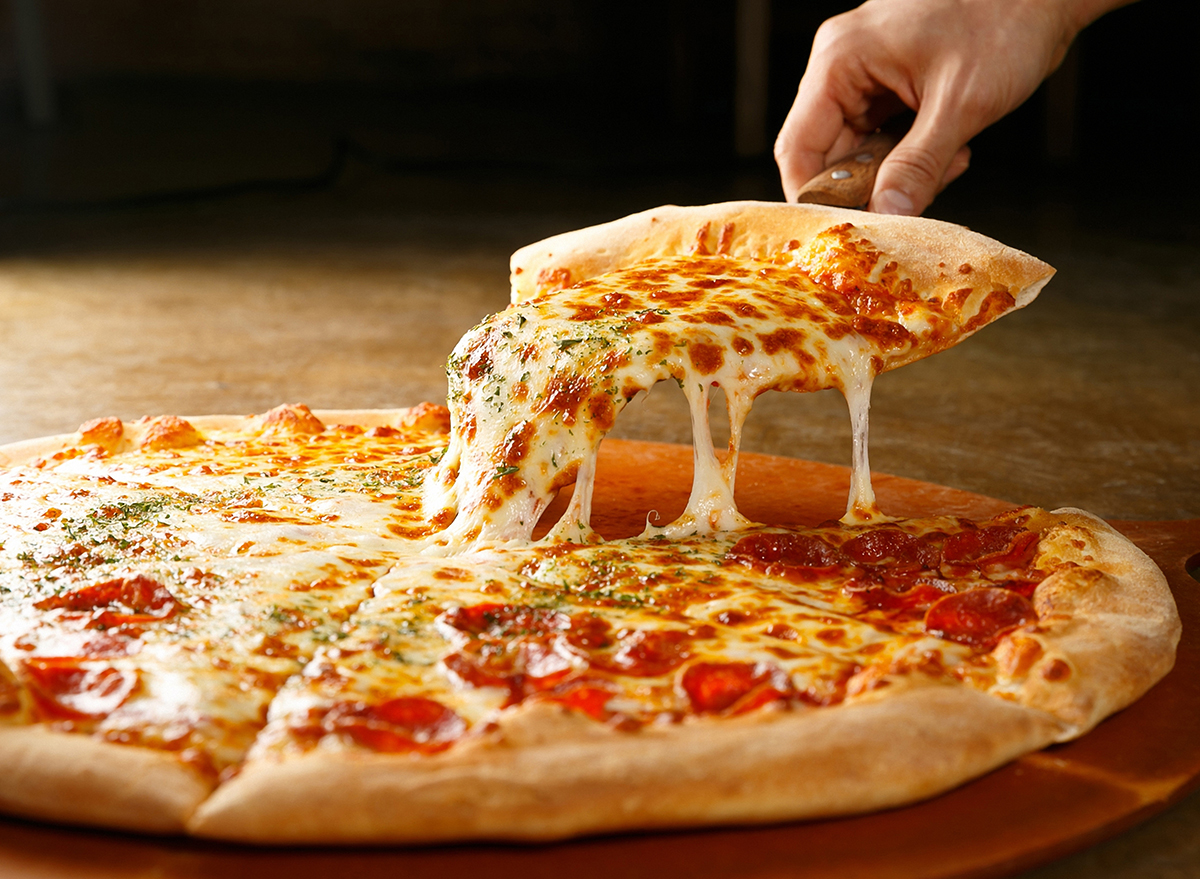
Following cheese, pizza is the second biggest contributor of heart-taxing saturated fat in the United States. Rather than ordering a large pie for a movie night in, stick to just one slice and pair it with a side salad to help promote satiety and up your intake of fiber, a macro that helps lower bad cholesterol and keeps your ticker in top health.
Soda and Diet Soda

Soda is simply not good for you in any way, and it’s most certainly not helping your heart at all, either.
“Drinking soda has serious consequences,” Dr. Splaver says. “Regular soda promotes an insulin spike, which leads to weight gain and can cause a host of metabolic disorders. And the sugar can lead to inflammation, which causes cardiovascular disease. Consuming diet soda will tell your pancreas to make more insulin, which will increase your adiposity (fat deposits) and risk of cardiovascular disease.” Swap your soda (or diet soda) for sparkling water with a squeeze of fresh fruit.
Deli Meats
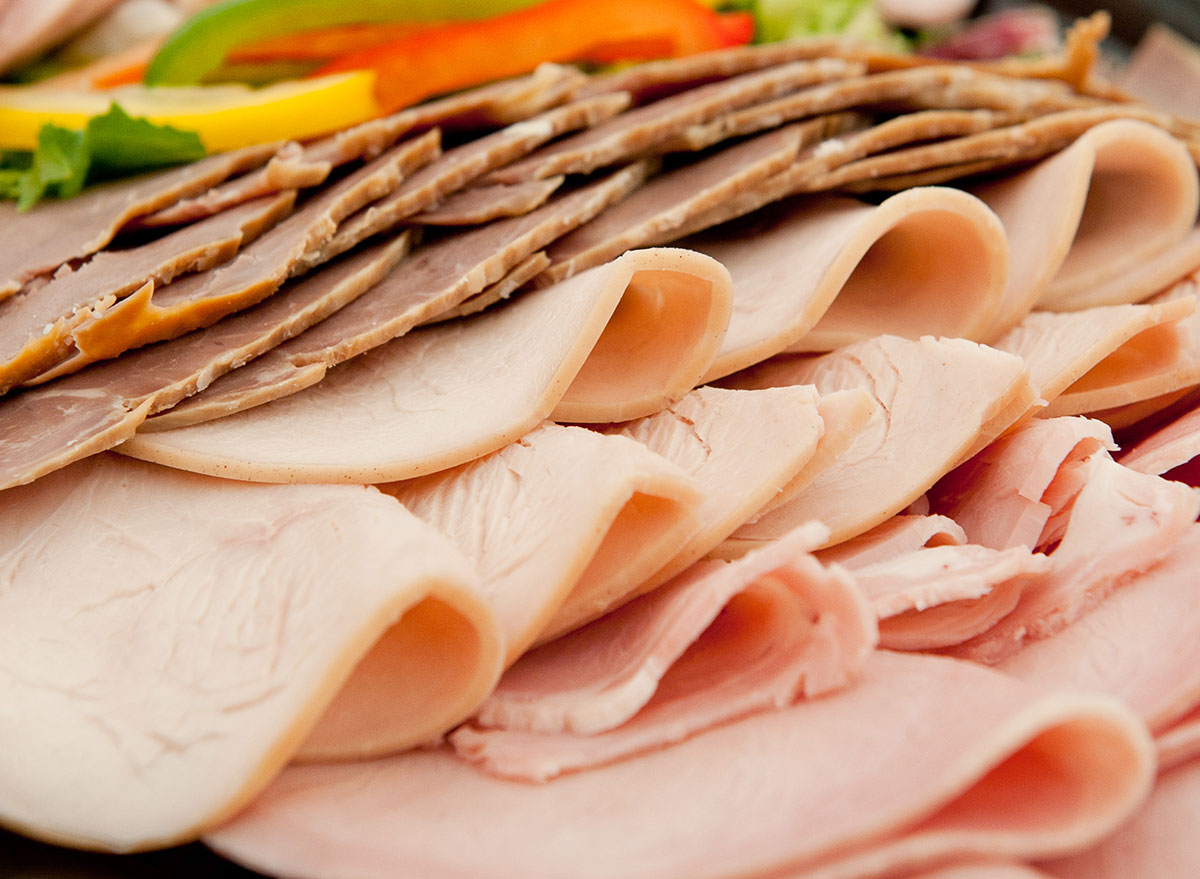
According to a Current Treatment Options in Cardiovascular Medicine report, only 33 percent of Americans are looking to cut back on sodium. However, according to a Journal of the Academy of Nutrition and Dietetics study, nearly half of Americans consume a sandwich every day—and they’re one of the top sources of salt in the American diet. Coincidence? We think not. The bread and condiments certainly don’t help the situation, but cold cuts and cheese are the primary culprits, contributing about 250 milligrams of sodium per slice. And let’s be real: We all use at least three or four slices of the stuff, which can equate to 1,000 milligrams of salt in a single sitting. Not good for your heart at all.
Candy
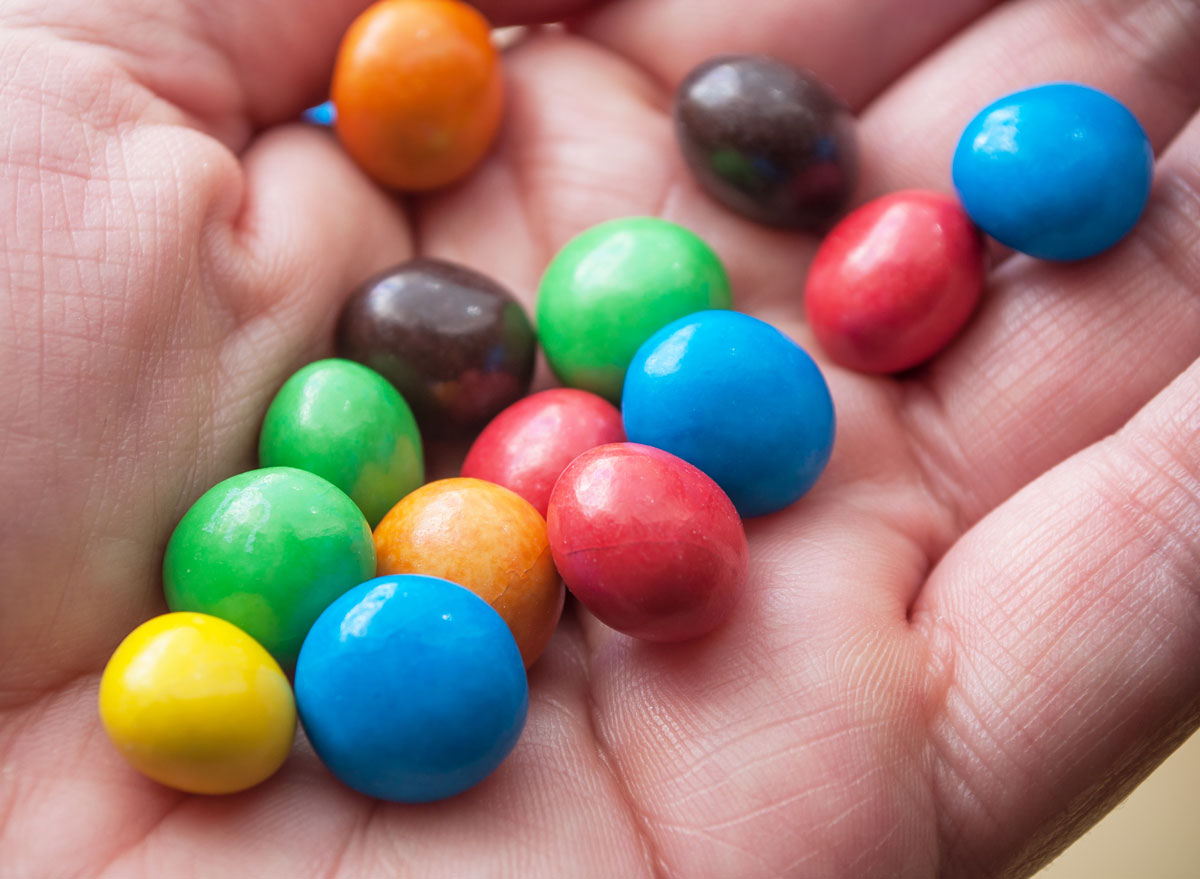
Americans consume a staggering 22 pounds of candy each year. And while most of it is chocolate, we doubt the population is picking the heart-healthy 70 percent dark chocolate bars over a Snickers every time. Whether you’re grabbing a lollipop at the doctor’s office or popping a handful of M&Ms after lunch, candy is basically straight-up sugar in every shape and form. And it can increase fatty deposits, putting you at risk for heart disease.
High Fructose Corn Syrup
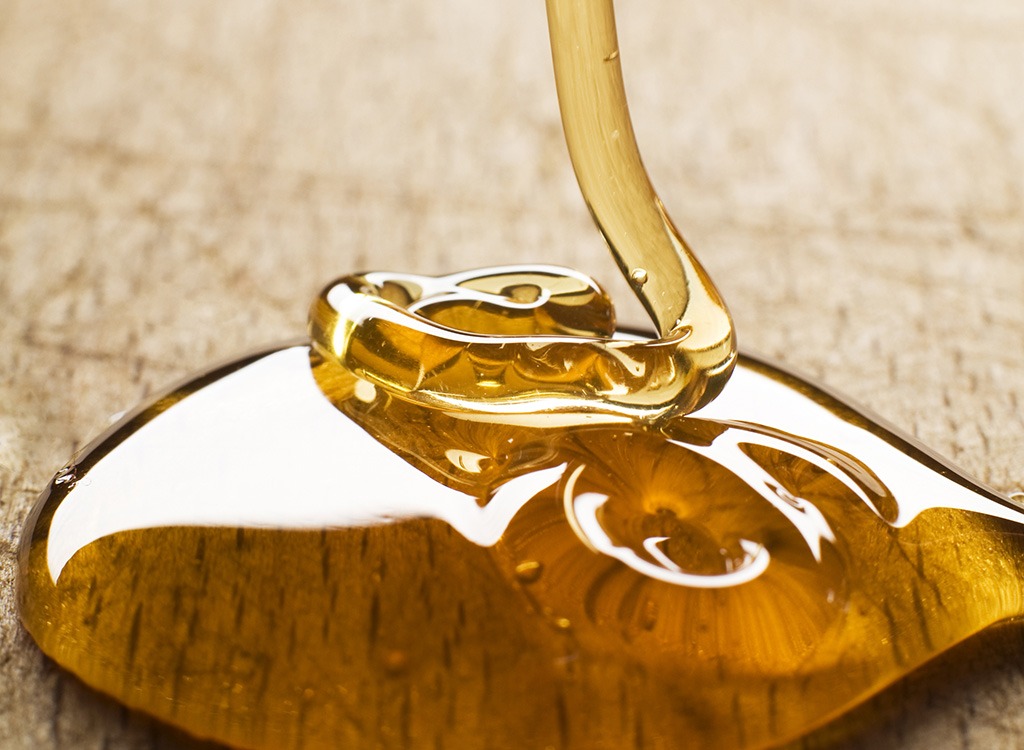
Sugar, in general, is bad for your heart. But high fructose corn syrup could be one of the worst offenders. Dr. Splaver warns that fructose can overload your liver and cause insulin resistance. This can lead to metabolic disorders such as Type 2 diabetes. And those who have diabetes are more likely to develop heart disease, which leads to a greater risk of a heart attack or even a stroke.
Fried Chicken
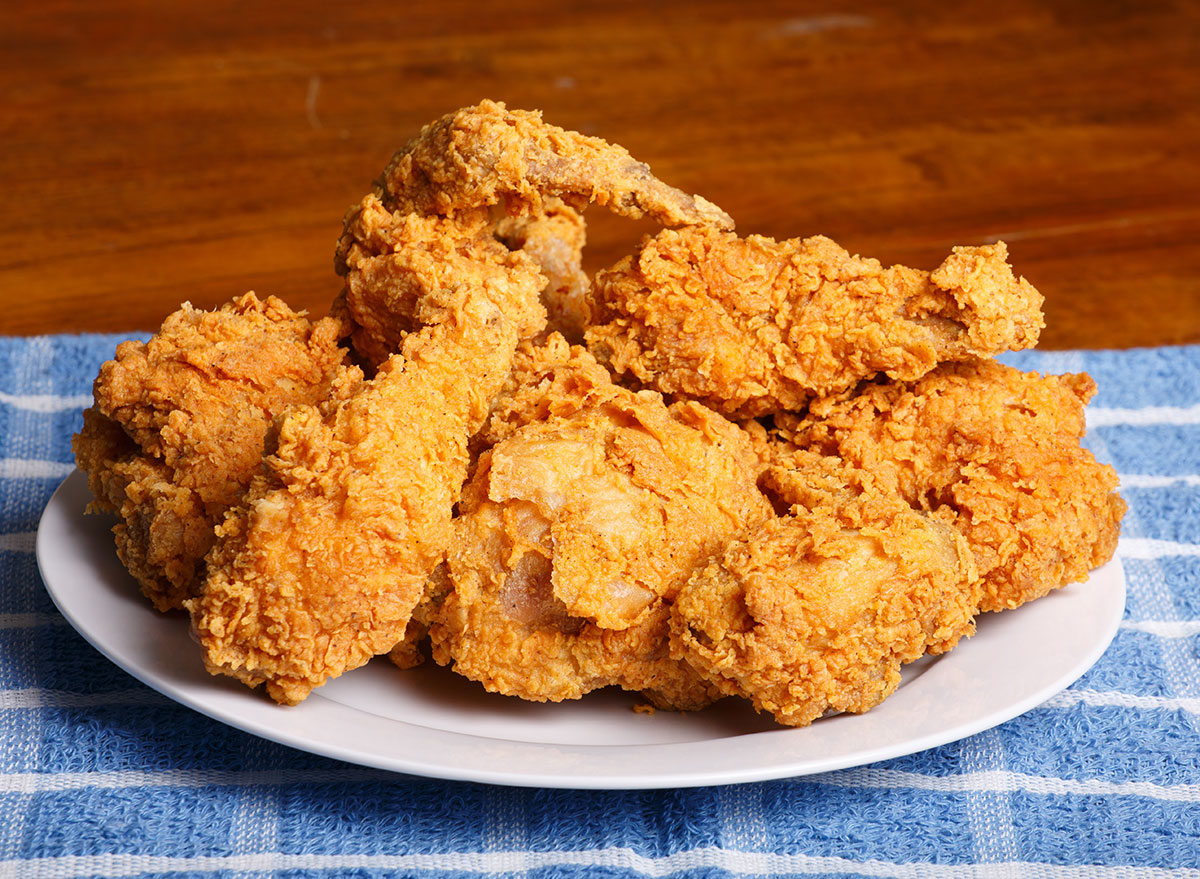
Grilled chicken breast is one of the best proteins for weight loss. But when you keep the skin on and dunk it into a deep fryer, the nutritional reality of your meal changes—and fast. In fact, one four-ounce serving of fried chicken with the skin on it has as much cholesterol as 11 strips of sizzling bacon! Do your heart a favor and opt for a more heart-healthy piece of poultry.
White Bread
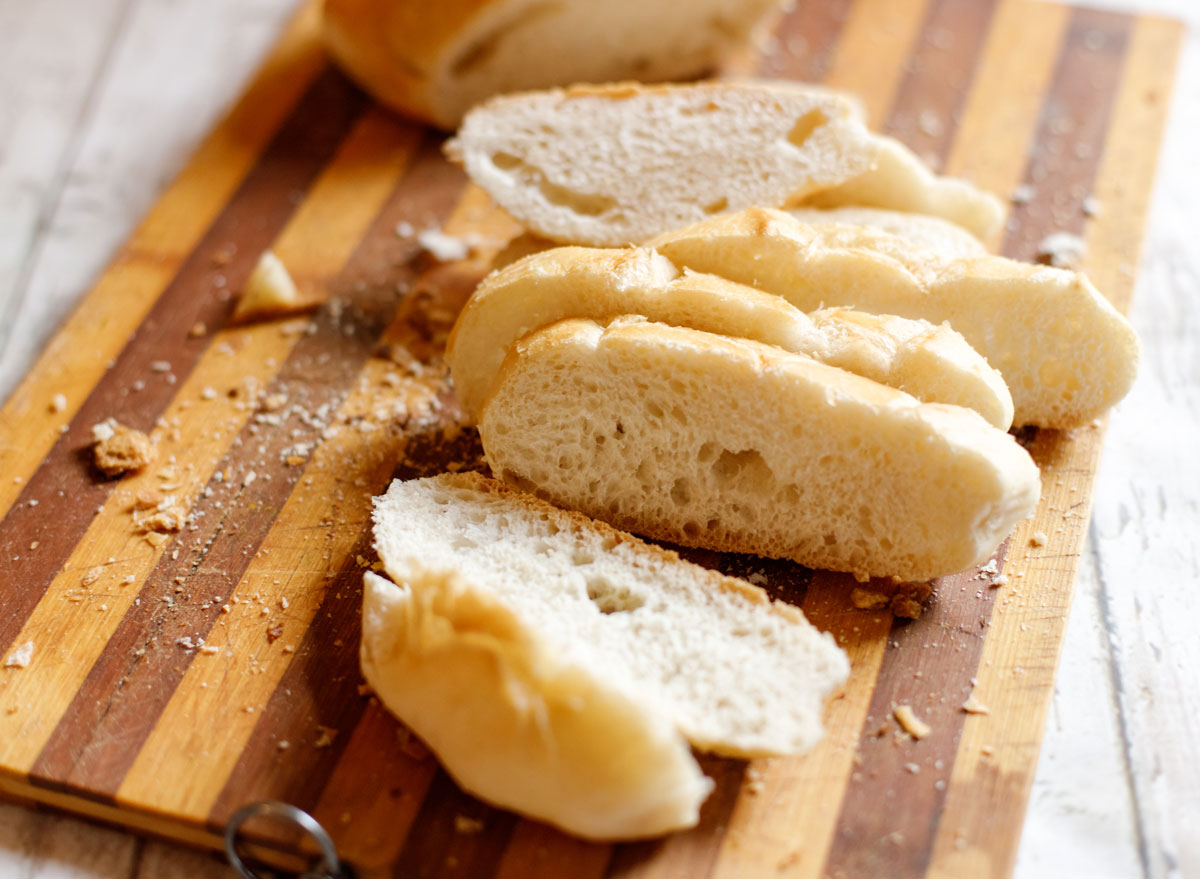
Swapping out that loaf of Wonder bread for fiber-rich Ezekiel bread could prevent heart disease, lowering your heart attack risk. Unlike unadulterated whole grains, refined grains, which are found in white bread, are stripped of the fiber, minerals, phytochemicals, and healthy fats that promote heart health.
Biscuits
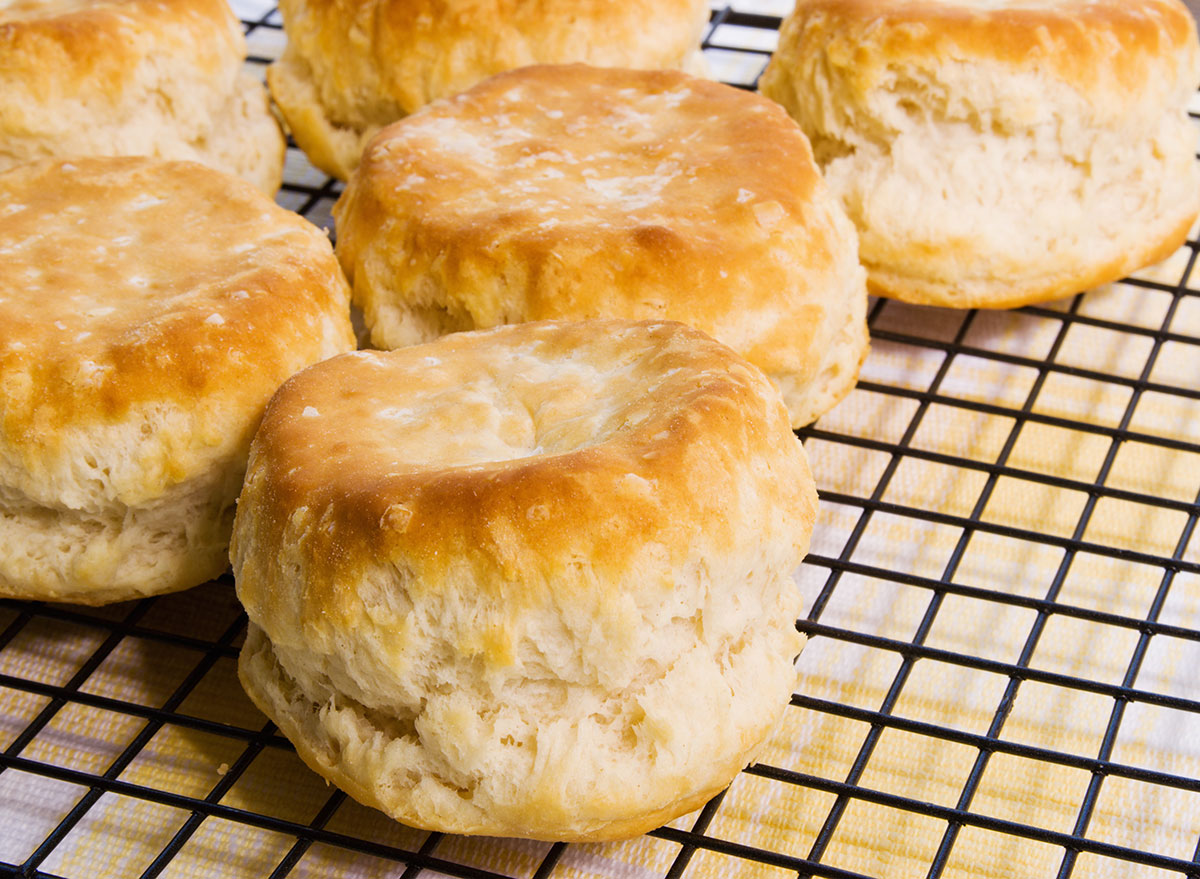
Bad news, Southern food lovers: Packaged biscuits—the fluffy pillows of goodness that make weekend brunch and fried chicken dinners extra delicious—are chock full of trans fats that can hurt your heart. And though the nutrition label on Pillsbury Grands! Buttermilk Frozen Biscuits reads “0 grams” in the trans fat column, they’re made with hydrogenated soybean oil—a dead giveaway that there are still traces of the dangerous fat in the biscuits.
Fruit juice
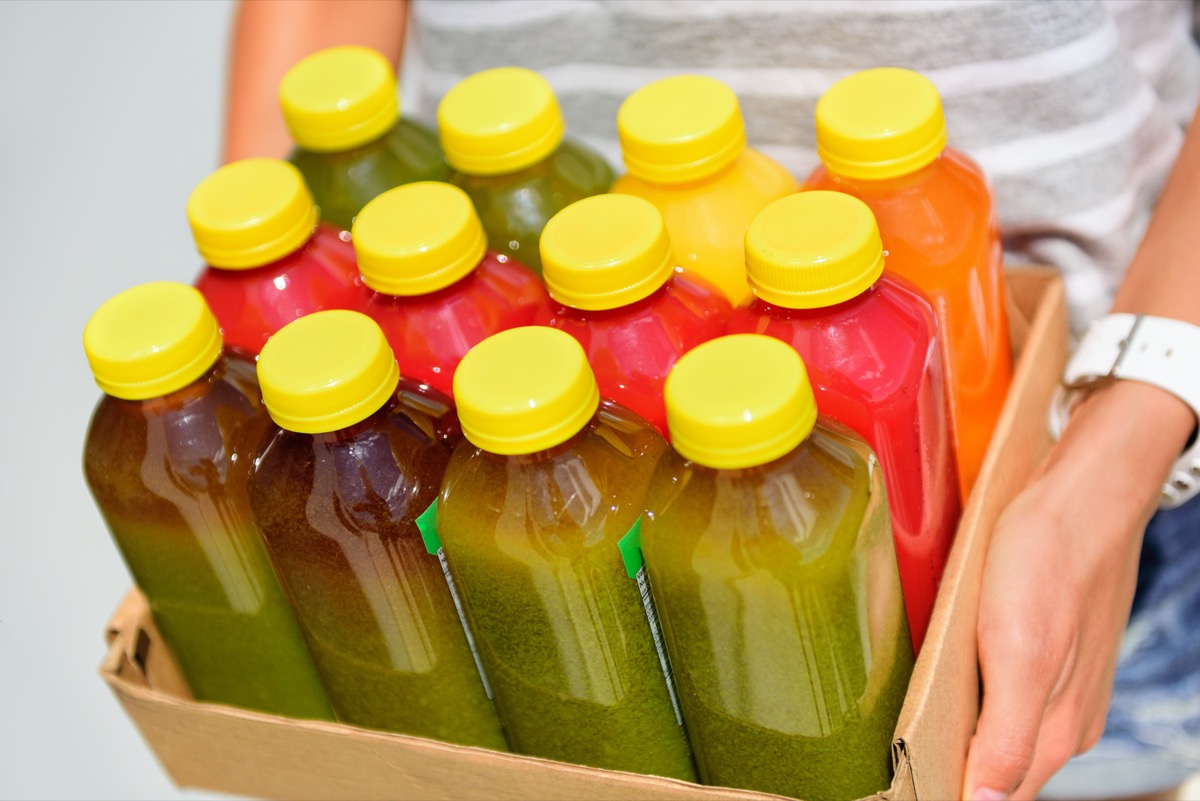
While 100 percent fruit juice may be a better pick than soda or other sugary drinks like Sunny D, the natural stuff can pack dozens of grams of sugar per serving—or what you would get from nearly four Krispy Kreme glazed donuts. And by drinking your fruit and vegetables without the skins, you lose the essential fiber that could help normalize elevated blood lipids, a key risk factor for heart disease.
Still opting for juice? Be careful of portion size, as most bottles appear to be one serving but most likely are two, thus doubling the calories and sugar grams you may be drinking in one sitting.
Chinese Takeout
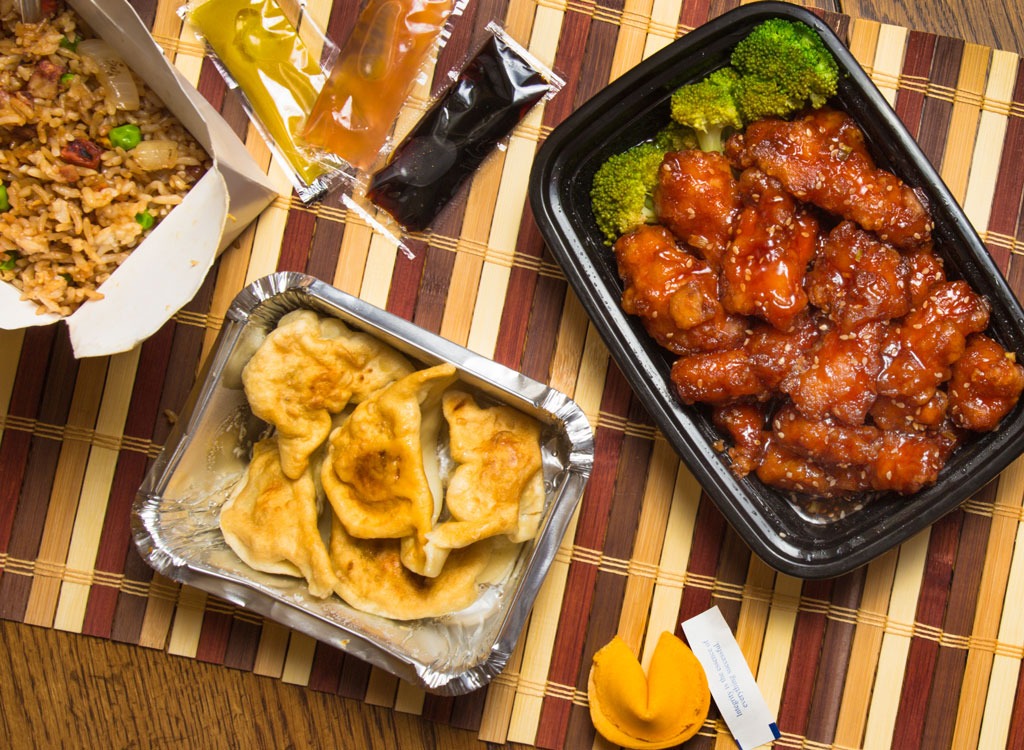
Chalk it up to Chinese takeout’s sweet sauces, fried tempura breading, and extra-large portions. The hefty amounts of sugar, fats, and salt in takeout can shock your body enough to elevate your risk of high blood pressure and clot formation post-dinner. In fact, a heavy meal may increase the risk of heart attack by about four times within just two hours after eating, according to the American Heart Association.
Potato Chips
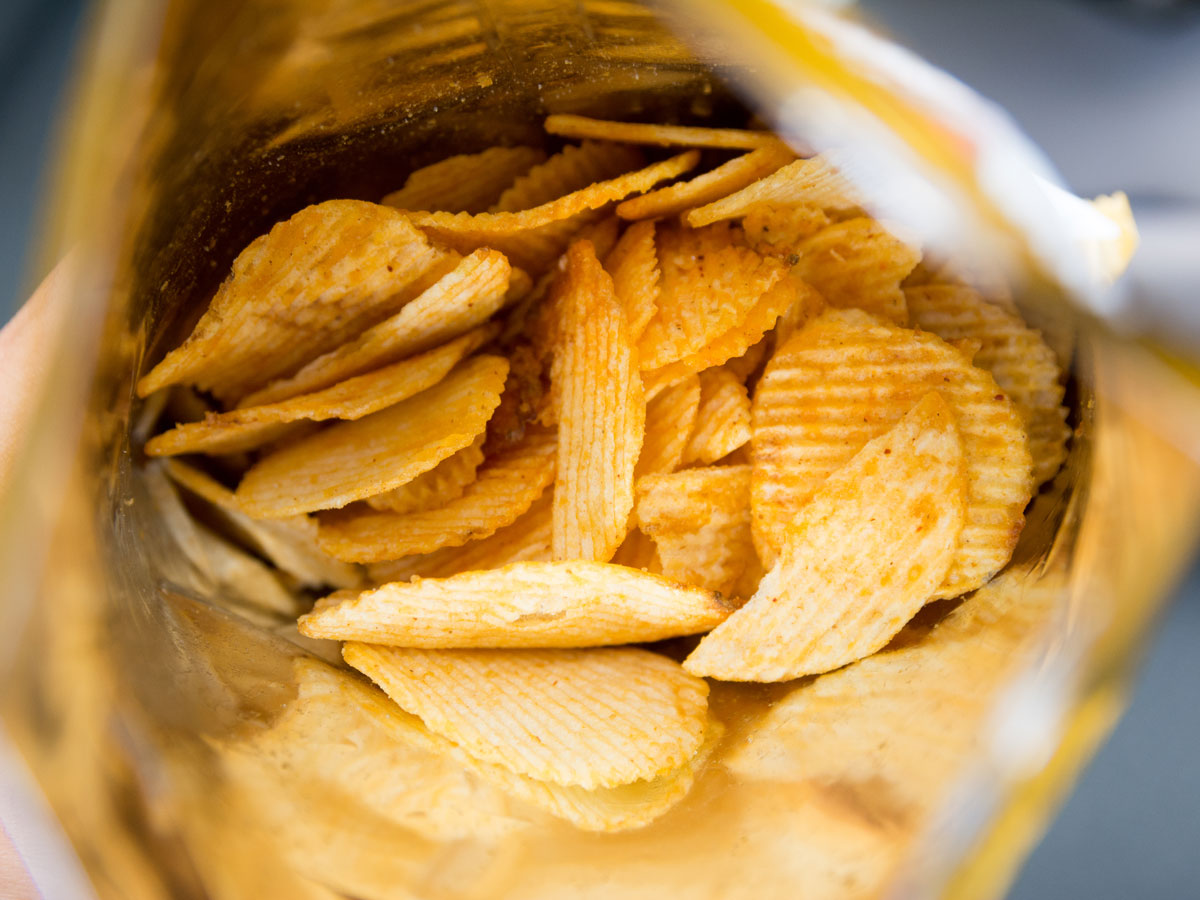
It’s no secret that potato chips are not a friend to a healthy eating plan. They’re high in calories, fat, and sodium—and are especially hard to quit noshing on after just one serving. A low-sodium diet is essential for a healthy heart, as eating more than 2,300 milligrams (equivalent to one full teaspoon) of salt a day can result in high blood pressure, a serious risk factor for cardiovascular disease. Save your heart and skip the crunchy, salt-dusted spuds.
Jarred Tomato Sauce
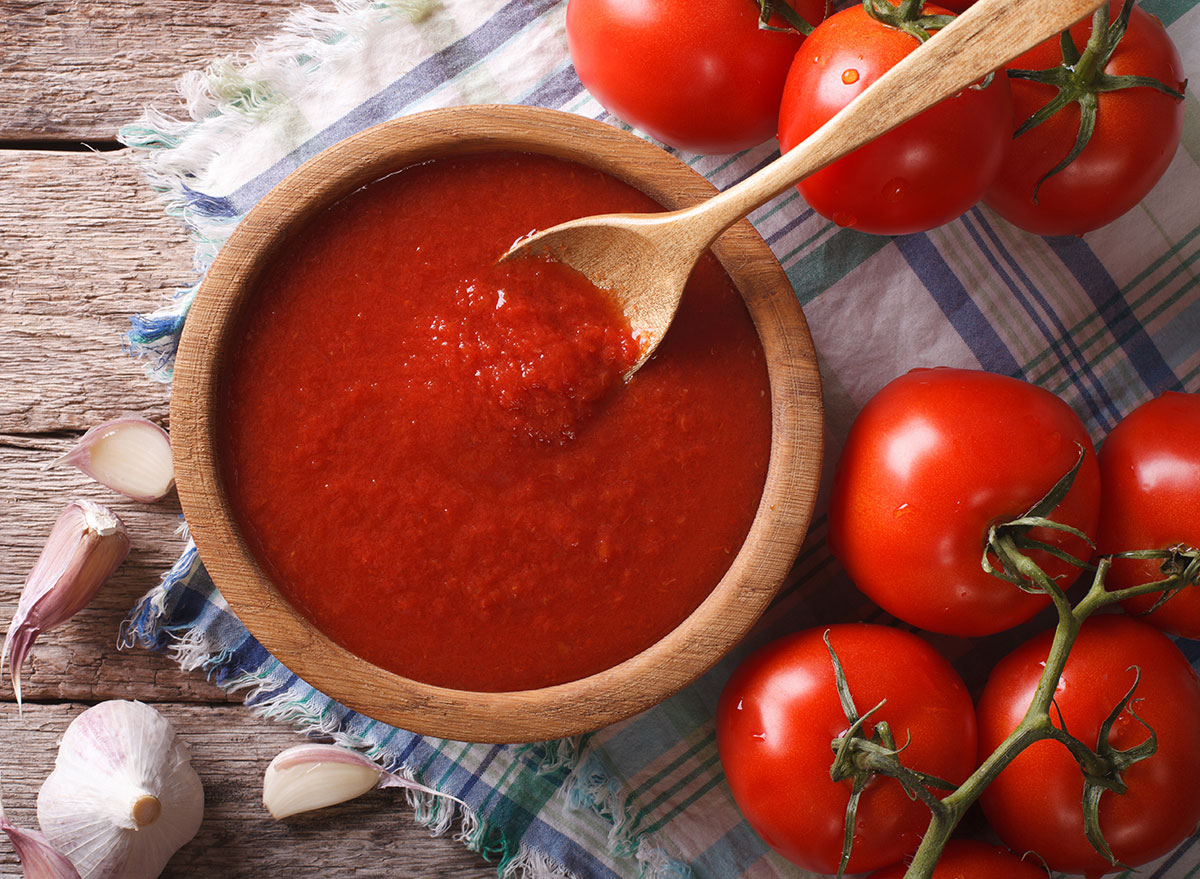
Want some pasta with that salt? A quarter-cup of Hunt’s Tomato sauce packs a whopping 380 milligrams of sodium. To keep your blood pressure from spiking, look for jars of tomato sauce with fewer than 350 milligrams per serving.
Coffee Creamer
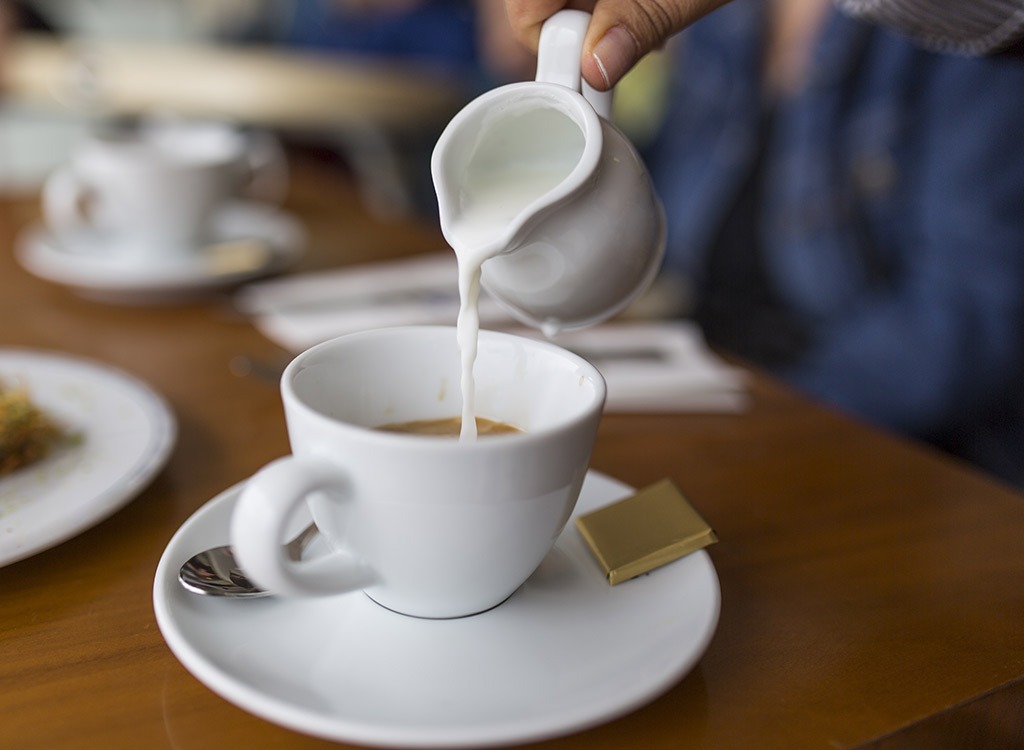
Traditional coffee creamers are prime sources of trans fats, often hiding under the guise of a lesser-known name: hydrogenated oil. Our advice: Switch to plain milk, rather than the pre-packaged stuff.
Margarine
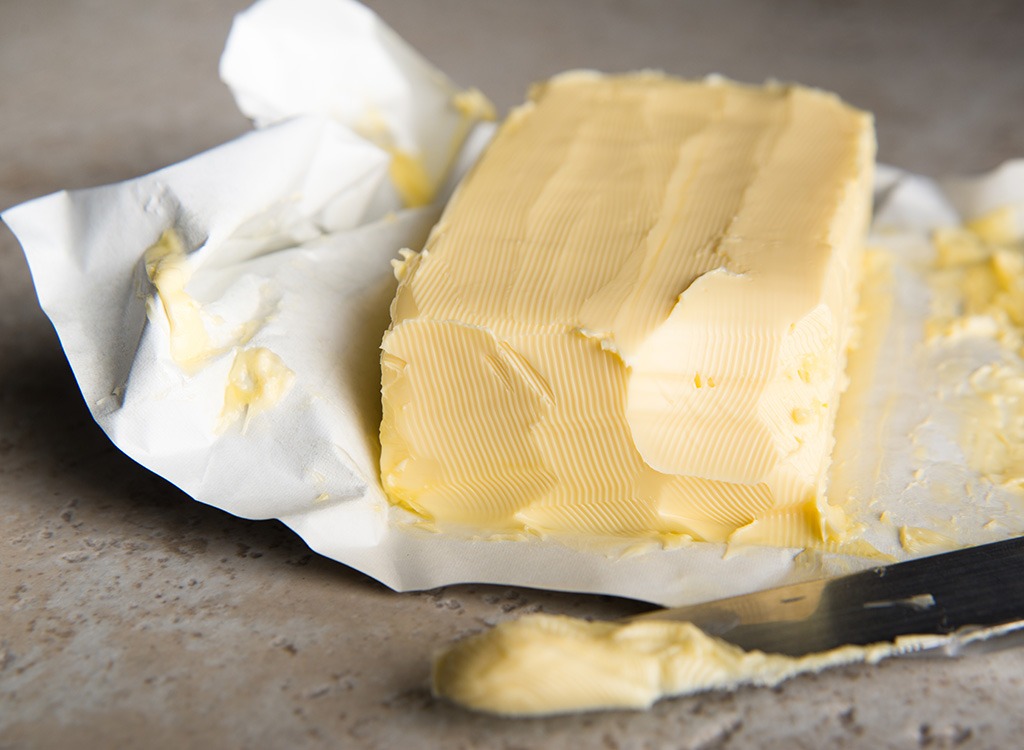
Butter alternatives like margarine are often made with partially-hydrogenated oils, one of the most common sources of trans fats, which have been linked to heart disease. Skip this high-cholesterol food and stick with heart-healthy olive oil or small amounts of grass-fed butter instead, suggests Isabel Smith, MS, RD, CDN.
Blended Coffees
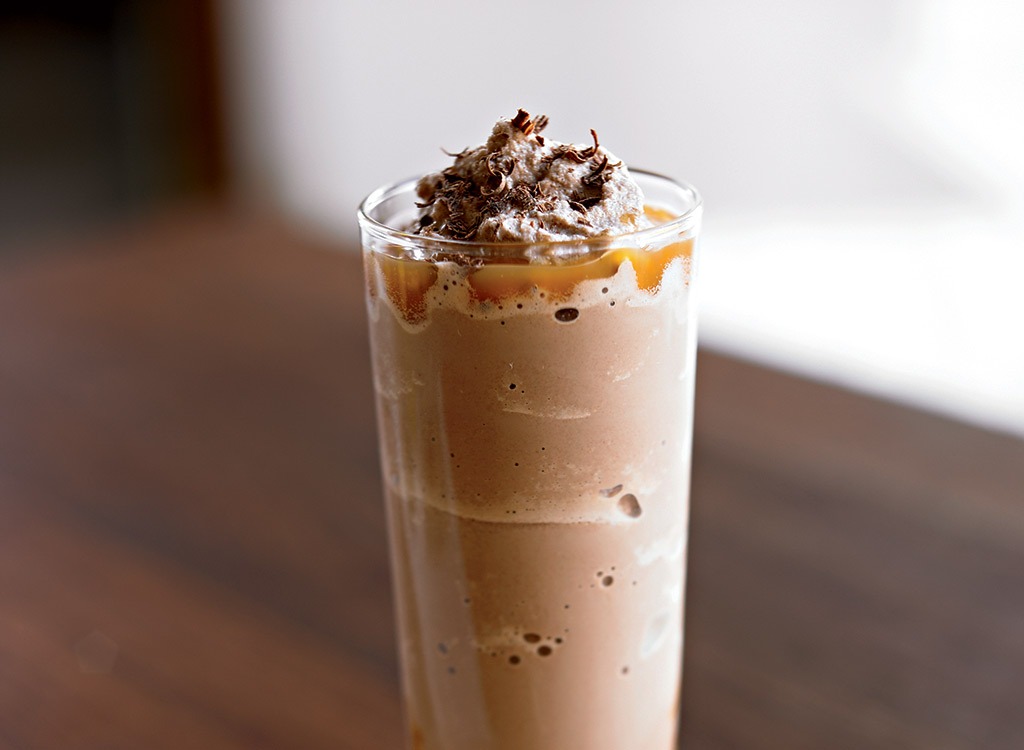
Warning: Blended coffees laced with syrup, sugar, whipped cream, and other toppings can have as many calories and fat grams as a milkshake. Not only can the sugar overload send blood glucose soaring, but the caffeine can also increase your blood pressure levels—a combination that’s less than ideal if you’re trying to ward off diabetes and heart disease. To stay healthy, stick with plain java with milk and cinnamon, a spice that’s been shown to decrease the risk of heart damage as a result of high blood sugar.
Bacon & Sausage
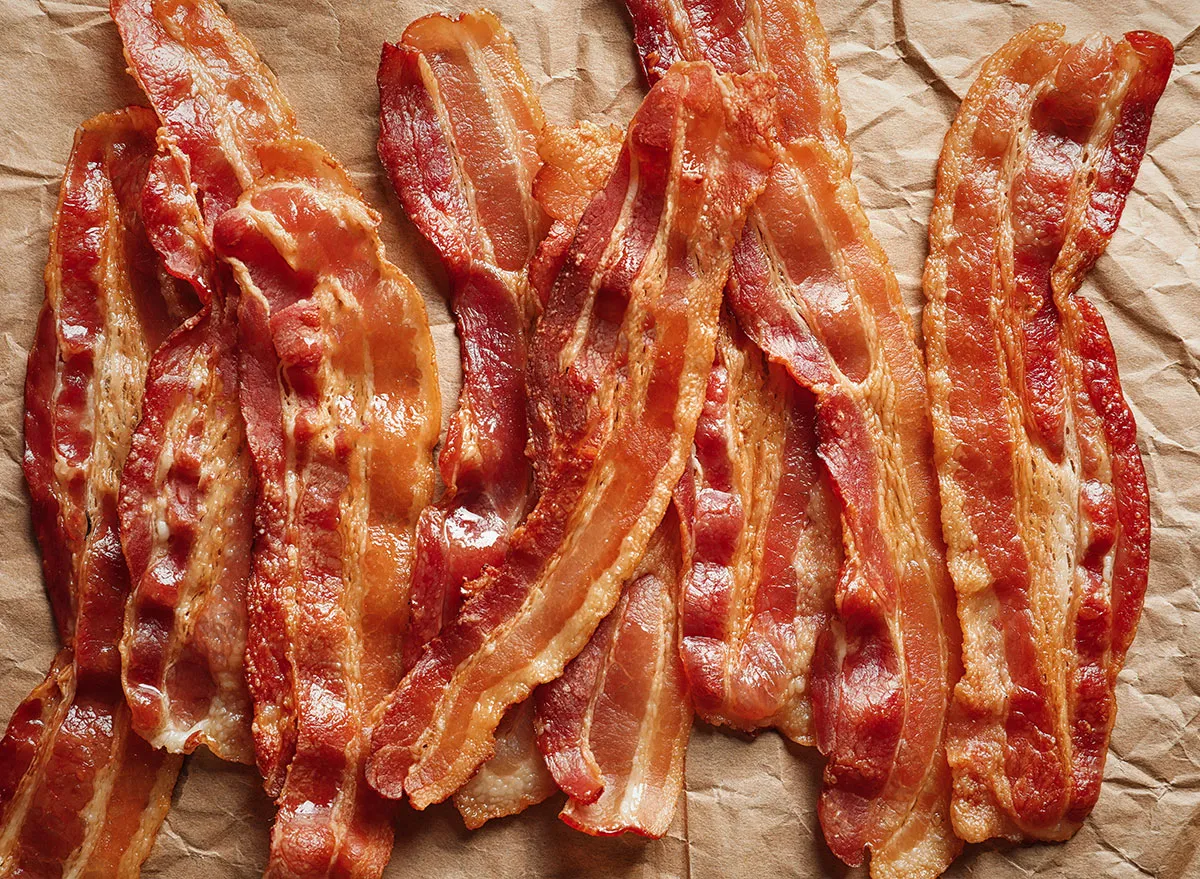
The bacon and sausage you enjoy for breakfast and the deli meats you use to make your lunch may be putting your health at risk. How? Many of these meats contain nitrates, a preservative that interferes with the body’s natural ability to process sugar, which increases the risk of diabetes. If that wasn’t bad enough, most processed meats are also loaded with sodium, a known contributor to hypertension that can make you bloat and set you up to develop heart disease.
White Rice
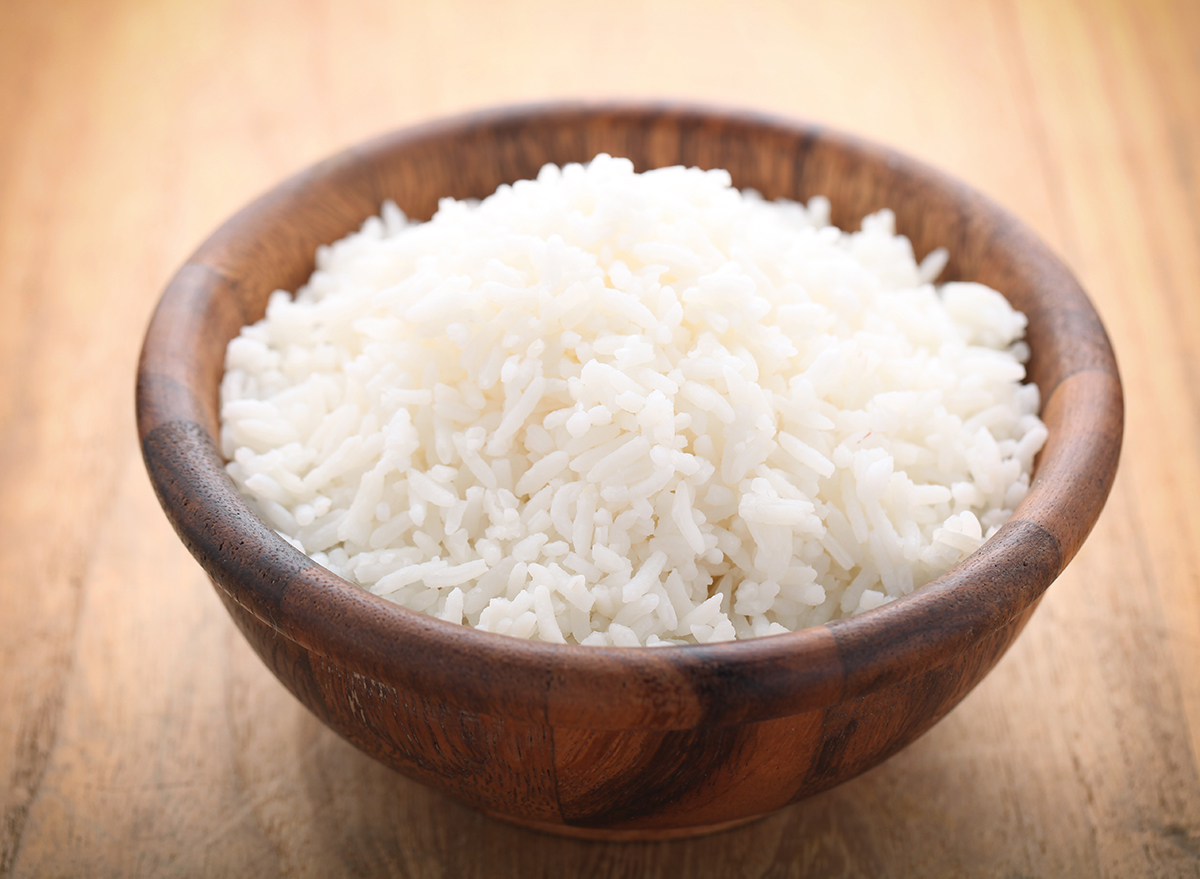
Whole grains can reduce your risk of dying of heart disease, but nutrient-stripped refined grains have the opposite effect on your health. Stick with whole grains to ward off potential health issues.
Frozen Meals
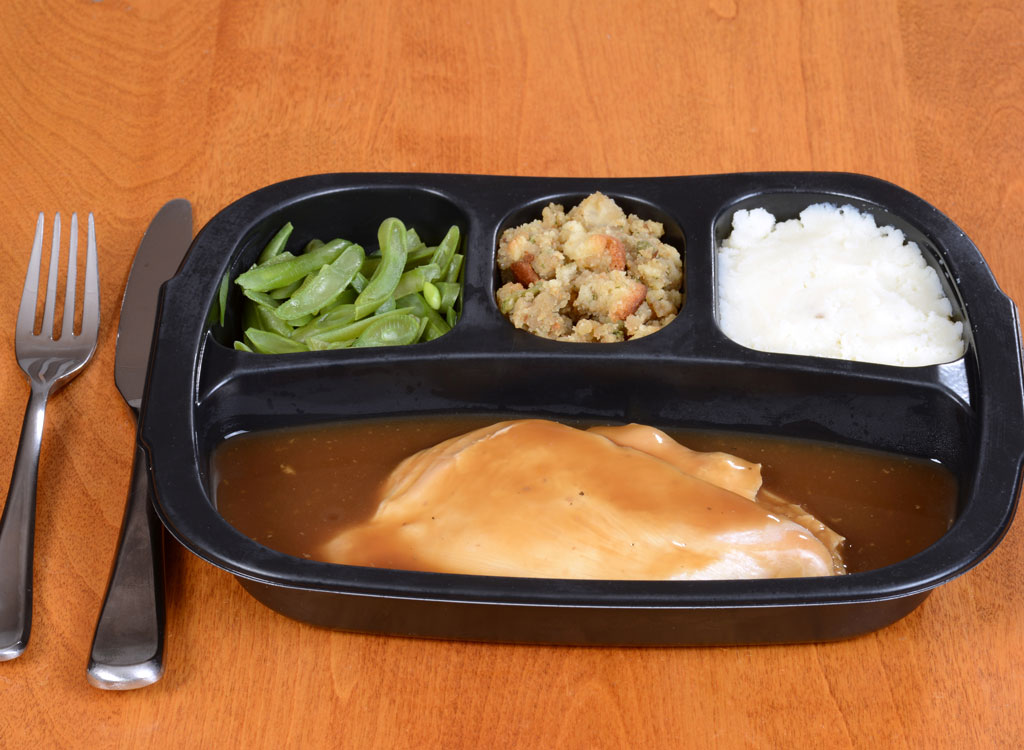
Frozen dinners may be quick and easy options when you’re time-strapped, but they’re also loaded with sodium. (Yes, even the healthy-sounding options.) Two prime examples: Lean Cuisine’s French Bread Pepperoni Pizza and Special K’s Sausage, Egg, and Cheese Flatbread Breakfast Sandwich each pack 700 milligrams of sodium, or just under half a day’s worth of the stuff. When you’re in the freezer aisle, look for meals with less than 500 milligrams per serving.
Cottage Cheese
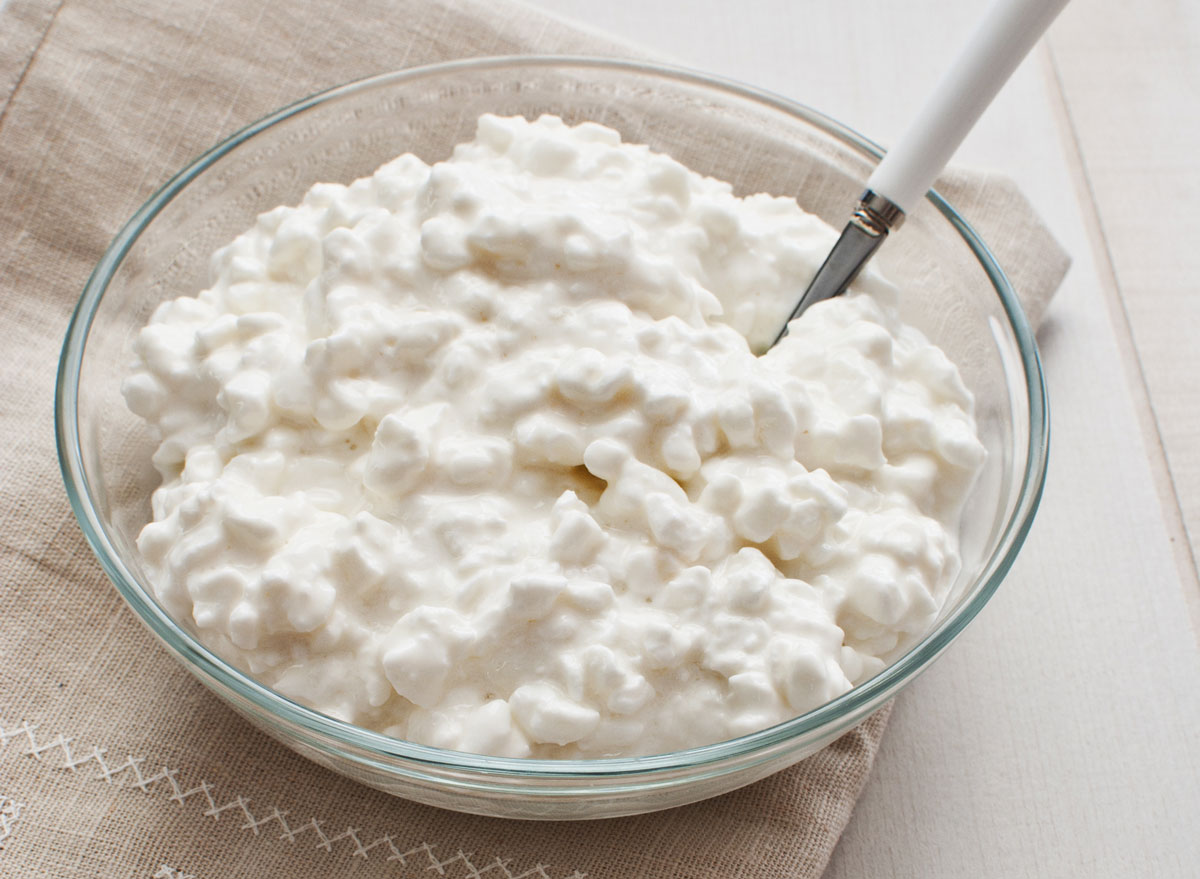
Even though this breakfast staple doesn’t taste salty, a one-cup serving can carry around 700 milligrams of the mineral—more than a third of what you’re supposed to have in an entire day. If you’re going to keep the stuff in your breakfast lineup, swap to a no-salt-added variety. Or, better yet, eat a container of Greek yogurt instead. You’ll get less salt and more protein, making this a win-win swap.
Ketchup

When it comes to your blood pressure and heart health, condiments matter. And the ketchup you dip your fries into is likely loaded with sodium. Scale back on the condiments to keep your ticker in tip-top condition.
Vegetable Juice
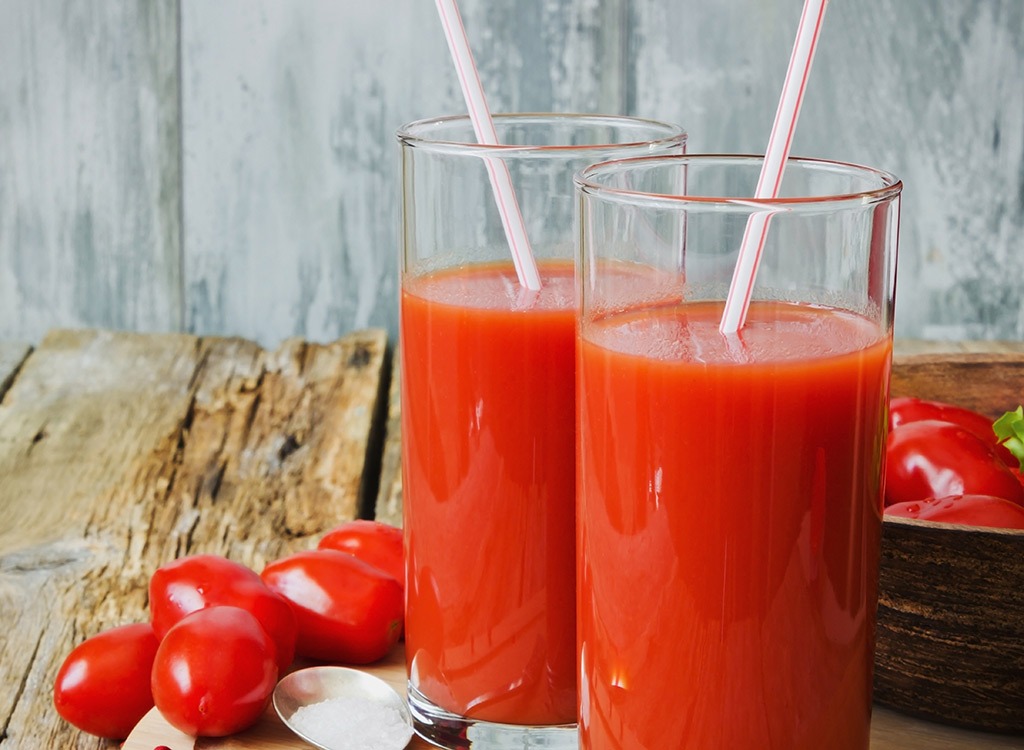
Prefer to sip your greens rather than chew ’em? Stick with the freshly made varieties from a local juice shop (or your kitchen). The bottled versions are filled to the brim with salt. For example, just eight ounces of V8 Original Vegetable Juice has 640 milligrams of sodium. If you have to sip the bottled variety, go for V8’s low-sodium blend. It will save you 500 milligrams of sodium, which could really make a difference in your blood pressure levels.
Restaurant Soup
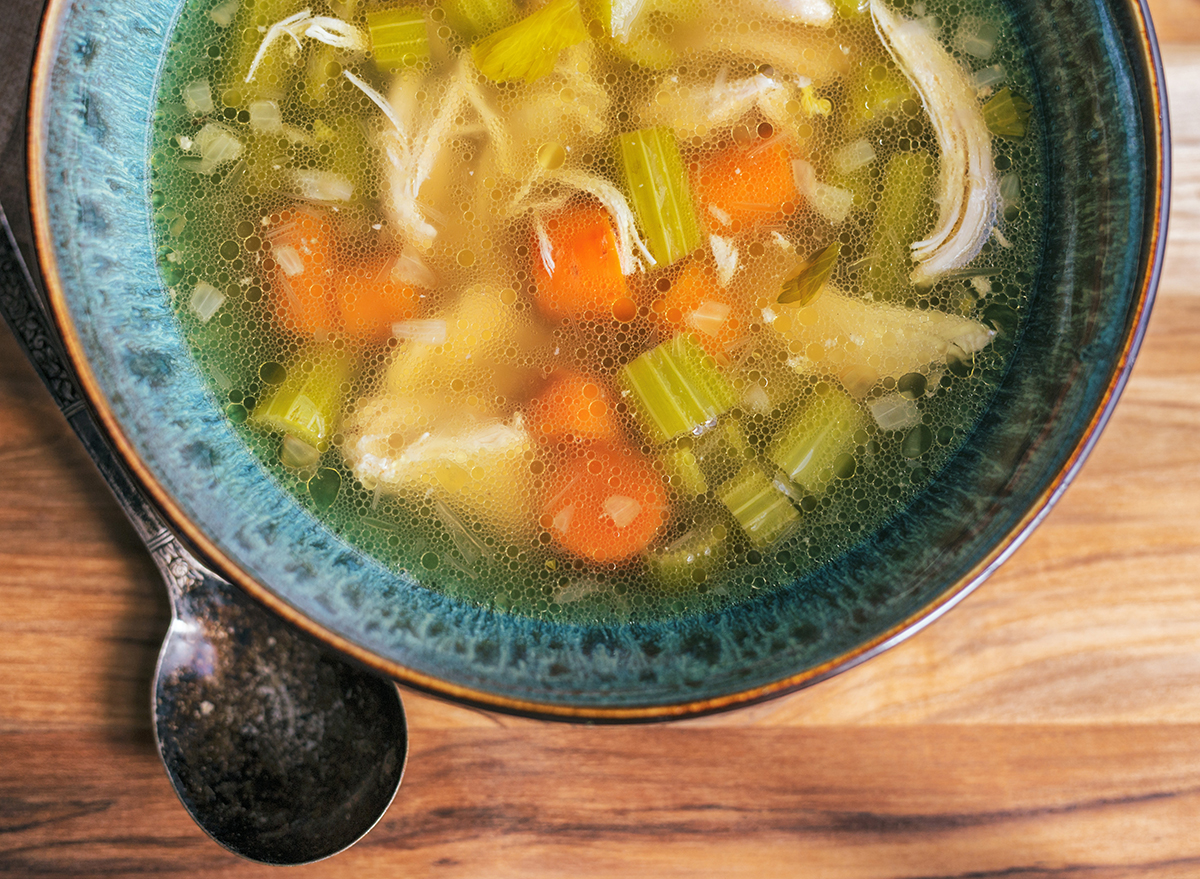
P.F. Chang’s Hot & Sour Soup Bowl packs an artery-clogging 3,800 milligrams of sodium per bowl. Not all restaurants’ soups are quite that salt-filled, but even chains like Ruby Tuesday and Applebee’s don’t ladle out many options with less than half a day’s sodium per bowl. Our advice: If you’re looking to enjoy something warming and delicious, make soup at home with the help of these soup recipes that burn fat.
When it comes to heart health, it’s never a bad idea to steer clear of added sugar and sodium. Your ticker will thank you.
